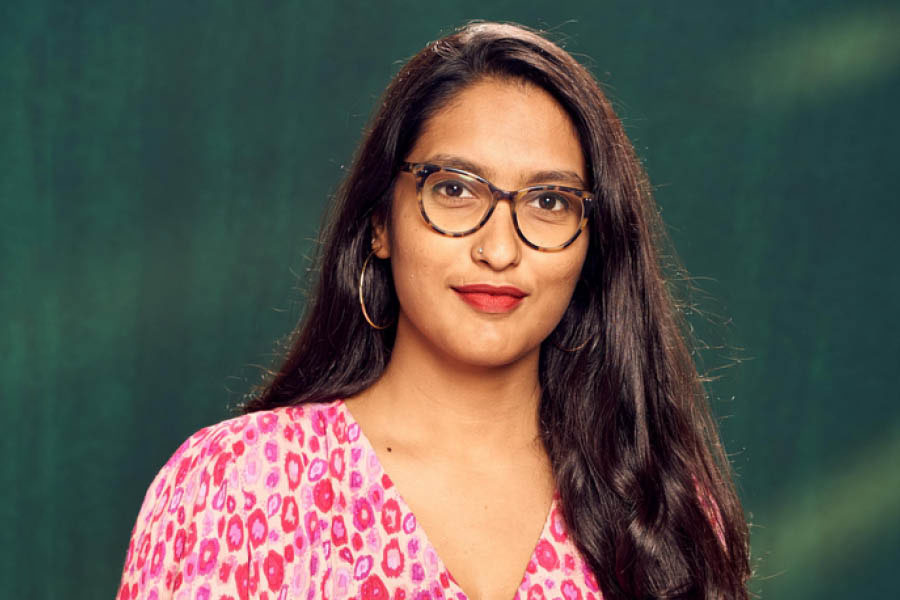Filmmaker Sreemoyee Singh says she discovered Iranian feminist poet Forugh Farrokhzad's works when she was a university student and that gave shape to a desire to visit the country and document the stories of its people in "And, Towards Happy Alleys".
The 75-minute documentary is a peek into the struggle of women, artists, and political dissidents in Iran. It is streaming on MUBI India.
The first-time filmmaker believes "And, Towards Happy Alleys" is as much about India as it is about Iran. The movie, shot in Tehran, is political but tackles issues of censorship in the country through the lens of cinema, music and poetry, she said.
"I have been singing and writing poetry all my life. Being able to express something in the right way matters to me. When I read Forugh Farrokhzad, I knew I had to go to Iran and meet these people, artists and understand how they find ways to be inspired," Singh told PTI in an interview.
"I knew that I had to film their stories and, hopefully, something will shape up. We have seen so many political things around us where we have not been allowed to preserve who we are through our art. It never felt like it was not my story to tell," she added.
Not having the baggage of expectations helped Singh capture moments of truth, whether it was meeting ordinary people on the streets or interacting with Iranian directors like Jafar Panahi ("The White Balloon", "The Circle") and Mohammad Shirvani ("Fat Shaker"), known for resisting government censorship at great personal risk.
Singh, a PhD degree holder in film studies from Kolkata's Jadavpur University, considers the film her love letter to Iranian cinema and filmmakers because the first window to its culture was through movies.
She remembers being surprised at how these films challenged her perception of the country which was known to her as a place of conflict.
"You don't think you will see such hopeful stories. I was curious to know where they found the inspiration to just have so much hope and the idea that life must go on despite what's happening around.
"I was reading Persian poetry because when you are taught the Iranian new wave, hopefully, good teachers will read out the poetry that inspired this cinema. Poetry, as a form of art, preceded everything else in Iran. It is the most important method of expression in a place like Iran." Farrokhzad's poetry, she said, spoke to her younger self, with its expression of desire which could be "just to have a Coca-Cola, warmth of the sun or desire as we understand it".
The director was surprised that Farrokhzad, whose poem has inspired the title of the documentary, spoke of desire in a place like Iran through her writings. Farrokhzad died in a car accident in 1967 at the age of 32.
Singh also found it easy to learn Persian, a language that once connected India and Iran, and that gave her an access to the culture, which would not have been possible had she been a regular tourist or someone from the West.
"I was expecting the kindness of the people that I saw in films but people were even kinder there. They made me so comfortable. They protected me and became like family.
"And people are crazy about our cinema. Like Hindi cinema that reaches Iran... Films of Raj Kapoor, 'Sholay' and everything... They are just crazy about it... India is not even a land they consider far off from their country. So, I was loved even more." "And, Towards Happy Alleys" had its world premiere at the Berlin International Film Festival's Panorama segment last year and has since travelled to festivals around the world. Singh said she chose the festival because many Iranians have migrated to Germany.
The filmmaker recalled a memorable Q&A session following the gala screening, where someone from the audience, an Iranian, asked her to sing. This kept happening at every screening that followed. This, she said, was deeply moving. Women are not allowed to sing publicly in Iran.
In one of the scenes that she has captured in the documentary, Panahi -- who encourages her to become a part of the story she's narrating while driving her around -- shuts the door of a store as he requests Singh to sing 'Soltane Ghalbha'.
"My mentors or the people who liked my work, they told me that this truly is your film. The fact that you are so open with your voice and the way you express is what holds the film together. So, I accepted it," she said.
The film was shot in Tehran before the 2022 Iran civil unrest which was sparked after the 22-year-old Mahsa Amini died in the custody of police after she was allegedly beaten for violating Iran's strict hijab law. Several women took to the streets demanding justice and freedom but the protests were violently crushed.
The documentary also features her interviews with human rights activist Nasrin Sotoudeh, author Jinous Nazokkar, actor Farhad Kheradmand. She also interviews Aida Mohammadkhani and Mina Mohammadkhani, the two child actors of Panahi's "The White Balloon" and "The Mirror".
Did Singh worry that those who participated in her documentary would face trouble back home once it is released? "Mostly the common people you see in the film are either reading poetry or just talking about everyday things. But people who talk about politics have been doing this before and it is now part of their identity.
"I was careful that other characters don't talk about politics directly. Another reason that it took me seven years was because I knew that most of the women that you see in the film were trying to leave the country and have done so. Aida now lives in Canada now and her sisters have migrated to Turkey."
Except for the headline, this story has not been edited by The Telegraph Online staff and has been published from a syndicated feed.











